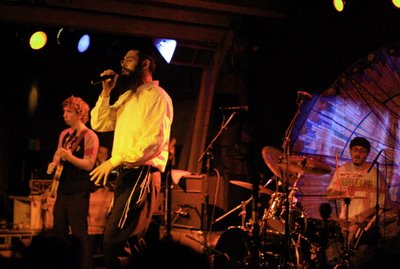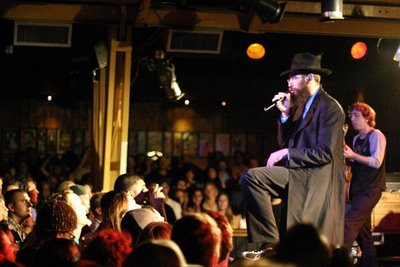How Matisyahu became a pop phenomenon.
By Jody Rosen
When I first heard the Hasidic Jewish reggae vocalist Matisyahu, I assumed his was a novelty act with distinctly limited appeal, destined to cause a small sensation among Heeb magazine subscribers and other Jewish hipsters with an overdeveloped sense of irony and secret shtetl lust—the pangs of nostalgia that periodically cause assimilated Jews to yearn for the good old days of piety and poverty in the Russian Pale of Settlement. Anyway, silly me. Matisyahu is a hit with the goyim. The 26-year-old singer's 2005 album Live at Stubb's spent eight weeks at the top of Billboard's reggae chart, went gold, and continues to sell briskly. A single, "King Without a Crown," cracked the Top 40 and has made Matisyahu a mainstay on alternative-rock radio. Last week, Matisyahu released a new album, Youth, which seems likely to enter in the upper reaches of the Billboard 200.
In short, Matisyahu has become the most famous Hasid this side of the Baal Shem Tov, the movement's 18th-century founder. Whatever you think of the music, there's no denying the powerful novelty of the singer's shtick. The Top 40 has always been a pageant of excess, absurdity, and trans-ethnic pastiche, but there's not really a precedent for "Play MediaKing Without a Crown," which finds Matisyahu crooning, in a lilting pseudo-Caribbean patois, "I want Moshiach [the messiah] now," shouting out paeans to "Hashem" (Orthodox Jews' favorite term for God), and declaring "Me no want sensimilla …/ Torah food for my brain." The video for the new single, "Play MediaYouth," is like a bad Saturday Night Live skit come to life, with the tracksuit-clad young Hasid skanking across a Brooklyn rooftop, brown beard billowing beneath a homeboy's hoodie. What's next, an Amish boy band?
It all gets a little less surprising when you learn Matisyahu's back story. Turns out, he's a Baal Teshuvah, or penitent, a secular Jew who "returned" to the Orthodox fold—before he was Matisyahu, he was Matthew Miller, White Plains, N.Y., native and student at the New School University in Greenwich Village. Most tellingly, he was a dreadlocked Phish fanatic, from which we may infer that prior to discovering "Torah food," he had a rather different attitude toward sensimilla. His religious awakening occurred in college, after meeting a young Lubavitcher rabbi in Washington Square Park, where many impressionable young men have experienced spiritual epiphanies. Lubavitcher Hasidim are famous for their aggressive efforts to proselytize to non-Orthodox Jews, and Miller soon traded in jam-band fandom for 21st-century shtetl life in the Lubavitcher enclave of Crown Heights, Brooklyn.
Click Here!
Well, you can cut off the Phish follower's dreads, put him in 18th-century garb, and immerse him in Talmudic midrash—but the pull of post-hippie music is strong. Soon Matisyahu was performing his sub-Eek-A-Mouse-style dance-hall toasting for fellow yeshiva students, and, after securing the blessing of his rabbis, he put together a backing group and started playing the jam-band-club circuit. The sonic stamp of that musical subculture is all over Matisyahu's music. Roots reggae is one of the cornerstones of Deadhead musical taste, and Matisyahu's is a deeply old fashioned roots sound, miles away from the hip-hop-derived digital futurism of today's dance-hall reggae. His band is perfectly tight, but the aesthetic is white-boy-jam-band reggae, with lots of guitar filigree, frequent show-offy solos, and a far thinner bass sound than you'll hear on any Jamaican dance-hall record. On Youth, producer Bill Laswell tricks out the spartan rock-trio sound with some electronic touches, but it's just window dressing.
As for Matisyahu's vocals: They're adequate. He's got rhythm—he can chant-rap double-time rhymes—and if he sometimes sings off-key, so do most dance-hall artists. But there's no getting around the phony Jamaican accent; when, in "Play MediaJerusalem," he sings "In-a de ancient days, we will return with no delay/ Picking up de bounty and de spoils on our way," he sounds no less silly than Vanilla Ice did impersonating a gangsta.
The truth is, Matisyahu isn't really a novelty—his is the oldest act in the show-business book. Minstrelsy dates back to the very beginnings of American popular music, and Jews have been particularly zealous and successful practitioners of the art. From Irving Berlin's blackface ragtime numbers to Al Jolson's mammy songs—from jazz clarinetist Mezz Mezzrow, who passed as black, to Bob Dylan, who channeled the cadences of black bluesmen, to the Beastie Boys—successive generations of Jewish musicians have used the blackface mask to negotiate Jewish identity and have made some great art in the process.
Matisyahu is the latest in this line, and while his music is at best pedestrian, his minstrel routine may be the cleverest and most subtle yet. Matisyahu is like a thousand other white guys from the suburbs who've smoked a lot of dope, listened to some Burning Spear records, and decided to become reggae singers. But as a Hasid, he has a genuinely exotic look—that great big beard and the tzitzit fringes flying—and the spiritual bona fides to pull off songs steeped in Old Testament imagery. It's an ingenious variation on the archetypal Jewish blackface routine, immortalized in The Jazz Singer (1927), when the immigrant striver Jolson put on blackface to cast off his Jewish patrimony and become American. In 2006, Matisyahu wears Old World "Jewface," and in so doing, becomes "black."
And there are more layers to Matisyahu's act. Musically speaking, Jewish reggae is not such a far-fetched idea; as many critics have pointed out, the plaintive minor-key melodies for which Jewish liturgical music (and Hasidic folksongs) are renowned are also staples of reggae. What's more, Matisyahu's appropriation of Jamaican music is really no more brazen than Rastafarians' appropriation of Jewish religious tropes. If a Caribbean islander can plunder Jewish scripture and call himself a lost tribesman of Israel, why can't a Jew sing a song to a one-drop beat in a phony patois? Lubavitcher Hasidim even have their very own Hallie Selassie-like demigod, the late Rebbe Menachem Mendel Schneerson, who many Lubavitchers regard as Moshiach himself.
And yet, despite the copious "Hashems" and what is undoubtedly the first reference to "treyf wine" ever to appear on a Top 40 album, there is very little distinctly Jewish content on Youth. The only invocation of the idea of Jewish nationhood—Judaism's organizing principle—comes in "Jerusalem," a nonsensical riff on the Bible's most beautiful poem of exile, the 137th Psalm. (Matisyahu sings: "Jerusalem, if I forget you/ Let my right hand forget what it's supposed to do." Huh?)
In fact, Youth has a lot more in common with a couple of other contemporary American religiosities. The album is soaked in therapeutic language: it's more Oprah than Torah. "Young man—the power's in your hands …/ Storm the halls of vanity, focus your energy," Matisyahu sings in the Play Mediatitle track. That emphasis on self-actualization and uplift, combined with Matisyahu's ceaseless diatribes about the moral impurity of secular life, is reminiscent of nothing so much as Christian rock. It's a reminder that Orthodox Jewish fundamentalists share a lot with their Christian counterparts, including political priorities—and that there's no one quite so beloved of the Left Behind crowd these days than Orthodox Jews, whose in-gathering in Israel is essential stage setting for the coming of the Rapture. (At which point, presumably, Jews will be cast into the hellfire.) As if to make explicit the burgeoning alliance, Matisyahu recently recorded "Play MediaRoots in Stereo," a duet with evangelical rap-rockers P.O.D. It's a cruddy piece of music and, as politics, it can't be good for the Jews.

